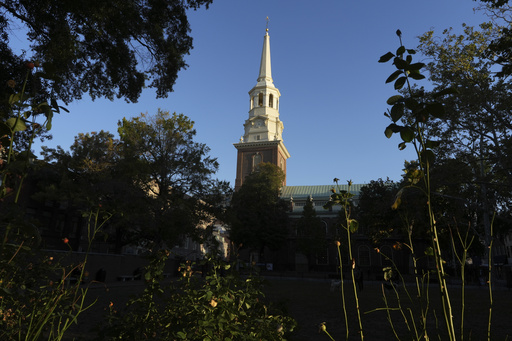
PHILADELPHIA — Nestled within a mile of each other in Philadelphia are two significant historic churches that have shaped American history. Christ Church is notable for being the worship place of several Founding Fathers and for its pivotal role in breaking away from the Church of England. Meanwhile, Mother Bethel African Methodist Episcopal Church sits on the land held continuously by Black Americans longer than any other parcel in the nation.
Even after generations, both churches remain vital to the spiritual lives of numerous individuals in Philadelphia. With an upcoming contentious presidential election looming, these congregations take their roles seriously, seeing themselves as guiding lights in a politically fractured environment, reminiscent of the fears once held by the Founding Fathers about national disunity.
Founded in 1695, Christ Church was the first parish of the Church of England in Pennsylvania, drawing in congregants from diverse backgrounds, including slaves, their owners, loyalists, and patriots. They would often hear sermons that varied widely in their opinions regarding independence. During that time, Anglican clergy, loyal to the British crown, led prayers for the king. However, in a bold act on July 4, 1776, church leaders erased the king’s name from the Book of Common Prayer, an act that signified strong revolutionary sentiment. This historical book is now preserved in a museum, symbolizing the church’s defiance during Independence Day celebrations.
In the following decade, debates concerning how to encompass revolutionary ideals such as liberty and freedom for all Americans intensified. The Rev. Jacob Duché, the church’s rector, initially served as a moderate voice, leading prayers as the first chaplain of the Continental Congress but later aligned himself with loyalists, prompting contention within the church. When British forces took Philadelphia in 1777, he urged George Washington to capitulate. This letter led to accusations of treachery, with Duché eventually exiled to England. His successor, the Rev. William White, is credited with preserving the unity of the church during these tumultuous times and went on to become the first presiding bishop of the Episcopal Church. Currently, the role of senior pastor is held by the Rev. Samantha Vincent-Alexander, who has made history as the first female rector in over 300 years.
While the members of Christ Church take pride in their historical ties to the nation’s fight for freedom, they also confront the uncomfortable realities of their past involving slavery. Some former congregation members engaged in the slave trade and rest in the churchyard close to the gravestones of those who signed the Declaration of Independence. Among them, Absalom Jones was a remarkable figure who, while enslaved to a church leader, managed to buy his freedom and became the first Black priest in the Episcopal Church, co-founding the Free African Society of Philadelphia to advocate for the rights of freed Black individuals.
Meanwhile, the African Methodist Episcopal Church emerged from a spirit of resistance and empowerment. Founded by the Rev. Richard Allen, who was born into slavery and later purchased his freedom, it originated after segregated treatment of Black worshippers at a Methodist church pushed Allen, Jones, and others away. They went on to create Mother Bethel AME, which became a haven for those escaping slavery via the Underground Railroad and later evolved into a significant location for Civil Rights Movement gatherings.
Presently, the AME Church is a global entity comprising over 2.5 million members across thousands of congregations worldwide. Reflecting on advancements, Pastor Rev. Mark Tyler acknowledges significant progress, but he also highlights ongoing challenges pertaining to racial equality in America, expressing concern about the political climate, particularly regarding the potential for a second Trump presidency. He articulates that the AME Church still plays an essential role in advocating for the Black community’s rights.
During a recent service, Rev. Tyler urged attendees to participate in the electoral process. Afterward, congregants reflected on America’s historical journey and its complexities. Tayza Hill, a 25-year-old parishioner, led a tour of their museum, showcasing an original pulpit once used by Rev. Allen and other notable leaders like Frederick Douglass and W.E.B. Du Bois. Hill emphasized the importance of maintaining the narrative of their history to prevent it from being forgotten or erased, stating that it is up to the nation and the church to safeguard the rights and dignity of those still fighting for true life, liberty, and the pursuit of happiness.
